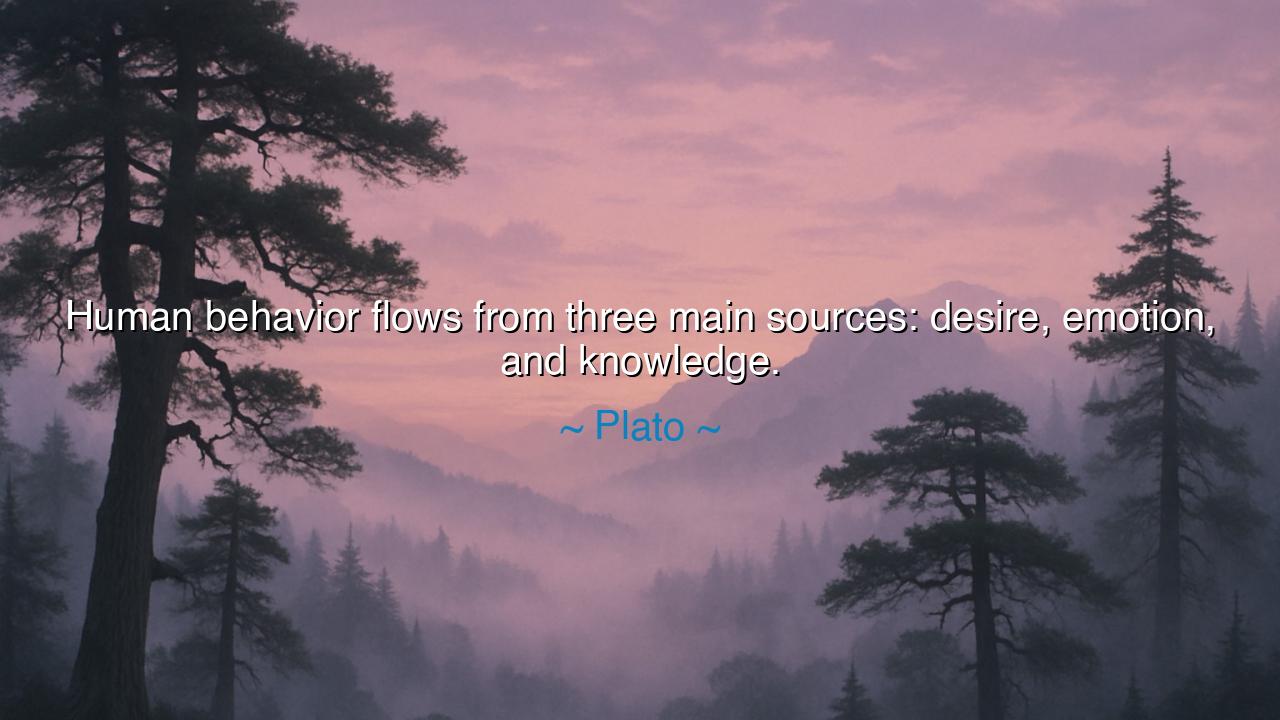
Human behavior flows from three main sources: desire, emotion






Hear, O children of wisdom, the words of Plato, the philosopher of Athens, who gazed into the depths of the soul and declared: “Human behavior flows from three main sources: desire, emotion, and knowledge.” These are not idle musings, but a map of the inner kingdom, a vision of what drives every action of man. For in the secret chambers of the heart, these three forces rise like rivers, and from their mingling comes the destiny of nations and the fate of every soul.
What is desire? It is the hunger that pulls us forward, the yearning for food, wealth, pleasure, victory, or love. Desire is fire—both blessing and danger. Without it, man would not move, would not dream, would not create. Yet when left unchecked, desire consumes, enslaving its bearer. The tyrant is ruled by desire; the sage governs it. Thus, desire is a river that can water the fields of life or flood them in ruin, depending on the hand that guides it.
And what is emotion? It is the storm of the soul, rising in joy, anger, sorrow, and hope. Emotion gives color to existence; it is the song that accompanies action. Without it, life would be cold, a hollow clockwork. Yet emotion, if ungoverned, becomes chaos, leading men to rage, to fear, to despair. But when harmonized, it becomes the heartbeat of courage, the spark of compassion, the strength of loyalty. Emotion is the wind—wild, invisible, yet powerful enough to steer the course of empires.
Then comes knowledge, the third source. Knowledge is the lamp that reveals the path, the compass that steadies desire and tames emotion. Without knowledge, desire is blind and emotion is reckless. But with knowledge, man learns balance—how to pursue what is good, when to yield, and when to stand firm. Plato himself, in his teaching, sought always to lift men from the shadows of ignorance into the light of understanding, for he knew that knowledge is the root of wisdom, and wisdom the guardian of the soul.
Consider the tale of Alexander the Great, disciple of Aristotle. His desire was for conquest, vast and unquenchable; his emotion gave him the charisma to inspire armies and the fire to endure hardship; but his knowledge, shaped by study, gave him strategy and vision. For a time, these three forces flowed in harmony, and he carved an empire from the edges of the known world. Yet in the end, when desire grew unchecked, and emotion unruly, knowledge was drowned, and the empire fractured. Thus, we see how the balance of these three determines the rise and fall of men.
So too in quieter ages: think of Abraham Lincoln, whose desire was not for power but for unity, whose emotions were tempered by sorrow yet deepened into compassion, and whose knowledge of law and humanity gave him the wisdom to guide a nation through civil war. In him, the rivers of desire, emotion, and knowledge flowed together, not for self, but for the good of all. And because of this harmony, his leadership became immortal, his life a beacon for generations.
The lesson, O seekers, is clear: you, too, are shaped by these three. Desire will call you, emotion will stir you, knowledge must guide you. Do not despise desire, but direct it. Do not silence emotion, but discipline it. Do not worship knowledge alone, but use it to balance the other two. When all three flow together in harmony, your actions will be strong, your choices wise, and your life fruitful.
Therefore, in your own days, practice this: reflect on what drives you. Ask yourself—is my desire worthy? Are my emotions steady? Is my knowledge sufficient to guide me? Strengthen each of these rivers, but let knowledge be the helm, desire the oar, and emotion the wind in your sails. For as Plato taught, all human behavior flows from these three—and to master them is to master the art of living.






AAdministratorAdministrator
Welcome, honored guests. Please leave a comment, we will respond soon